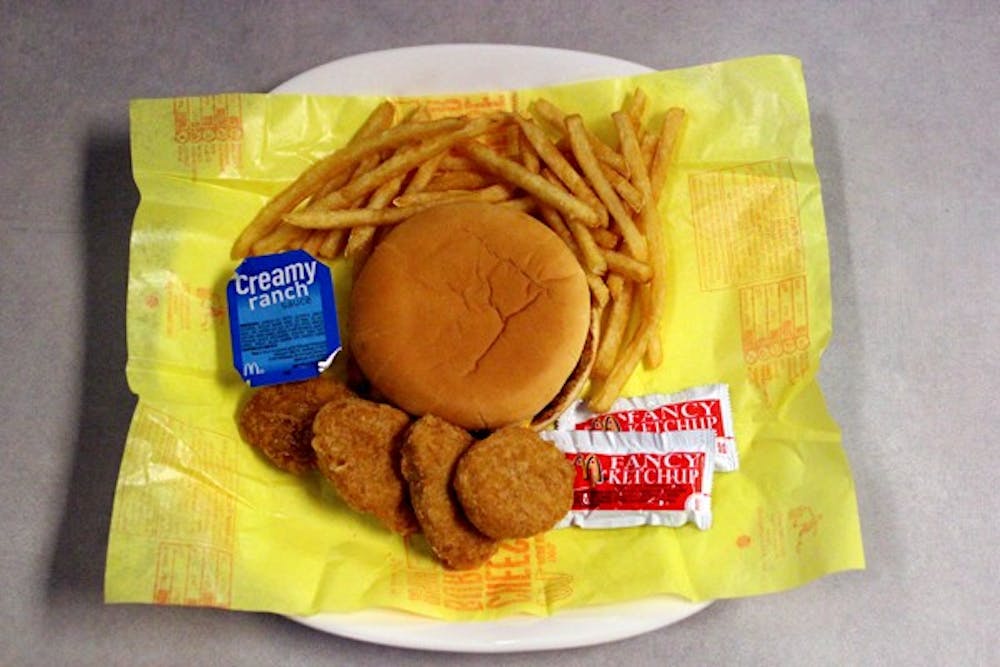Fast food lacks nutrients, provides students with cheap, easy fix
Two all beef patties, special sauce, lettuce, cheese, pickles, onions and a sesame-seed bun.
For some, it’s a welcome part of American cuisine, an easy, tasty reprieve from a stressful day. For others, the Big Mac, and other fast food cuisine like it, are a death sentence.
Upon hearing the words “fast food," Daniel Trolz immediately flared up.
“Fast food is awful,” the Jackson senior said. “Just awful.”
Three weeks ago, Trolz eliminated fast food from his diet. With the help of only one other change, a more strict work out regiment, he’s managed to drop five pounds.
“It’s all saturated fat,” Trolz said. “There’s nothing else in there.”
Lindsey Merkel, a registered dietitian, says one should proceed with caution when entering through fast food restaurants doors.
When it comes to nutrition, it’s pretty close to a wasteland.
“There’s very little in the way of nutrition in a fast food restaurant,” Merkel said. “ You can get enough to sustain you through the day, but you’re not going to find much which leads to nutrition.”
Double cheeseburgers and fried chicken sandwiches are obviously on a dietitians do-not-eat list, but even the healthier options don’t always have much going for them.
“The chicken is almost always entirely processed,” Merkel said. “And the dressing is also full of unhealthy products. You got to know where food comes from. If you don’t understand the process of creating the food, you’re not going to understand the impact your decisions have on your body.”
Subway is a prime example of a healthier fast food restaurant not exactly being really that healthy, Merkel said.
“I just find the Jared diet kind of ridiculous, it’s very clearly marketing,” Merkel said. “Subway offers very few actual nutrients you can consume, it’s usually wheat-based products with lots of sauce and meat produce, and an array of rather low-nutrient vegetables.”
Getting a handle on fast food consumption doesn't have to be cold turkey.
Fast food every once in a while isn't going to break your diet as long as meals are chosen wisely, Merkel said.
“I don’t think anyone should live a life of total deprivation,” she said. "I don’t think one McDonald's burger a year is going to ruin your chance of not getting health disease.”
The consensus around campus
Most Central Michigan University students don’t believe fast food is entirely incompatible with a healthy diet. Most believe with some restraint, one could enjoy a Big Mac from time to time.
Peter Strojny, a Mackinaw senior, is an example of someone who eats more fast food than Merkel would advise.
“Thirty percent (of my) diet is fast food, maybe 40,” Strojny said. “I recreate fast food. I have a bag of chicken patties in my fridge that taste just like the McChickens from McDonald's.”
Strojny said his key to keeping fast food as a staple to his diet is to not go crazy and overindulge.
“If you love McDonald's and you eat five pounds of it a day, super size everything, I think that’s when it starts turning really bad,” Strojny said. “If you just have it a few times a week, I don’t really think it’s a huge deal.”
Jordan Seros, a senior from Yale, said she thinks fast food's main benefit to most people is its convenience.
“It’s cheap and it’s easy,” Seros said. “Obviously, you want to eat better, but sometimes it’s the best you can do.”
Skyla Babbitt, a Brighton sophomore, said she generally eats a few french fries when she goes to a fast food restaurant.
The trick for her is portion control and smart choices.
“They have salads and other things you can get,” Babbitt said. “It isn't all unhealthy. A lot of it is what you choose.”




